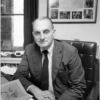Louis Auchincloss

Louis Auchincloss
Louis Stanton Auchincloss was an American lawyer, novelist, historian, and essayist. He is best known as a prolific novelist who parlayed his experiences into books exploring the experiences and psychology of American polite society and old money. His dry, ironic works of fiction continue the tradition of Henry James and Edith Wharton...
NationalityAmerican
ProfessionNovelist
Date of Birth27 September 1917
CityLawrence, NY
CountryUnited States of America
The glittering structure of her cultivation sits on her novels like a rather showy icing that detracts from the cake beneath.
With her high pale brow under her faded brown hair, she was like a rock washed clean by years of her husband's absences at conventions, dinners, committee meetings or simply at the office.
Keep doing good deeds long enough, and you'll probably turn out a good man in spite of yourself.
A neurotic can perfectly well be a literary genius, but his greatest danger is always that he will not recognize when he is dull.
To most readers the word 'fiction' is an utter fraud. They are entirely convinced that each character has an exact counterpart in real life and that any small discrepancy with that counterpart is a simple error on the author's part. Consequently, they are totally at a loss if anything essential is altered. Make Abraham Lincoln a dentist, put the Gettysburg Address on his tongue, and nobody will recognize it.
We were not as rich as the Rockefellers or Mellons, but we were rich enough to know how rich they were.
A common objection to inherited wealth is that it stifles the urge to work. I have not generally observed this to be true.
I used to go to church. I even went through a rather intense religious period when I was sixteen. But the idea of an everlasting life -- a never-ending banquet, as a stupid visiting minister to our church once appallingly described it -- filled me with a greater terror than the concept of extinction.
Society matters not so much. Words are everything.
There's no real alternative to what there is.
Decent artists go through bad times but eventually they do get recognized. It's by no means a battle lost. Yet.
Maybe when I'm dead, I'll be forgiven, but I'm afraid I'll also be forgotten.
I grew up in the 1920s and 1930s in a nouveau riche world, where money was spent wildly, and I'm still living in one!... The private schools are all jammed with long waiting lists; the clubs -- all the old clubs -- are jammed with long waiting lists today; the harbors are clogged with yachts; there has never been a more material society than the one we live in today.... Where is this 'vanished world' they talk about? I don't think the critics have looked out the window!
There is a charm, even for homely things, in perfect maintenance.